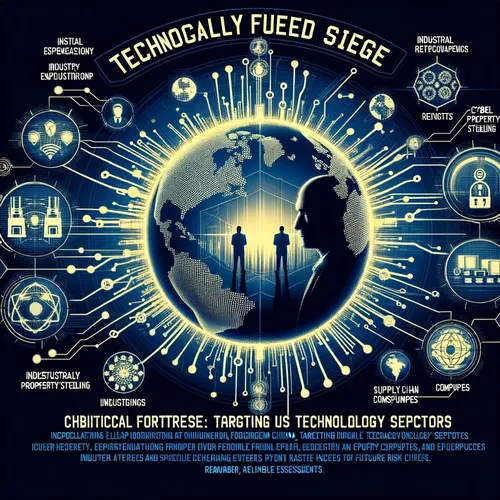Silicon Siege Shocker: China Hacks 200 US Firms Amid NVIDIA Deal Drama & AI Espionage Frenzy
- Author
- Quiet. Please
- Published
- Sun 31 Aug 2025
- Episode Link
- https://www.spreaker.com/episode/silicon-siege-shocker-china-hacks-200-us-firms-amid-nvidia-deal-drama-ai-espionage-frenzy--67573699
This is your Silicon Siege: China's Tech Offensive podcast.
Hey listeners, Ting here, your resident cyber sage, caffeinated and reporting on the relentless pixel-pounding tech contest we call Silicon Siege: China's Tech Offensive. If you blinked the past two weeks, oh boy—you missed cyber fireworks hotter than any Shanghai summer.
Let’s rip off the Band-Aid: On August 27, the FBI, with the usual grim tone, revealed that China’s Salt Typhoon hacking group compromised at least 200 U.S. companies in “the most extensive campaign seen in 2025.” Companies hit? Think tech titans, semiconductor suppliers, and one West Coast logistics unicorn that won't be getting their IPO confetti any time soon. Yahoo Finance had this on blast, with sources inside the Bureau whispering that, “The majority of breaches began as classic phishing but pivoted blazingly fast into deep supply chain infiltration.” Salt Typhoon’s real innovation? Quietly implanting “ghost code” in core enterprise resource planning systems—meaning U.S. firms might be dancing to a CCP backbeat and not even know it yet.
Down in California, Silicon Valley, the epicenter of “move fast and break things,” just got moved on, fast. According to reporting tied to sinologist Alex Joske and the Department of Justice, July saw a string of espionage charges against two Chinese nationals, Yuance Chen and Liren Lai. They weren’t after pizza recipes—they targeted naval personnel, military logistics, and blueprints for tracking systems. The feds said Chen even slipped aboard the USS Abraham Lincoln in San Diego, scooping up Navy identities for Beijing’s Ministry of State Security. And just as that news broke, a former engineer at a SoCal defense startup, Chenguang Gong, fessed up to stealing blueprints for the Chinese government. Silicon Siege? More like digital Trojan horse.
Meanwhile, trade secret threats to AI companies are surging. As highlighted by OpenTools AI, lawsuits against Chinese-linked startups have added serious valuation turbulence during U.S. funding rounds. Investors aren’t just hunting unicorns—they’re scared of buying tainted IP. This legal chess match is slowing down AI innovation, especially when top engineers slip away to “open research labs” in Shenzhen with thumb drives full of proprietary algorithms.
But maybe the wildest twist? According to TS2 Tech, NVIDIA can now sell its latest H20 AI chips to China—if it hands over 15% of those revenues to Uncle Sam! Welcome to the new era where economic warfare and clever policy fusion mean your graphics card is a political football.
Industry giants like Palantir are louder than ever, with CEO Alex Karp, via his new book “The Technological Republic,” lambasting Silicon Valley’s apathy on national security. He’s called Palantir America’s “digital arms dealer" in this AI arms race, arguing that tech companies have to pick a side—and fast. And with Palantir’s market cap now dwarfing Lockheed Martin and Northrop Grumman combined, that’s not hyperbole.
Cybersecurity experts say the real risk isn’t just a leaked design or a sabotaged cloud deal—it’s long-term, deeply embedded access to America’s innovation DNA. Expect even more aggressive supply chain audits and insane compliance expectations for U.S. tech, with lawsuits and countermeasures flying like sparks off an overclocked GPU.
So that’s your hot-off-the-server update, listeners. If you want more cyber drama, tech intrigue, and digital wit, subscribe so you never miss a pulse. Thanks for tuning in! This has been a quiet please production, for more check out quiet please dot ai.
For more http://www.quietplease.ai
Get the best deals https://amzn.to/3ODvOta
